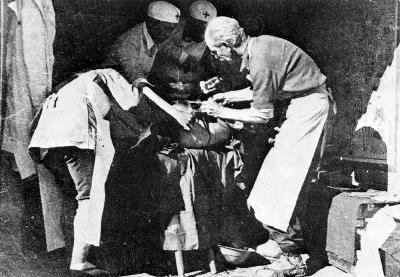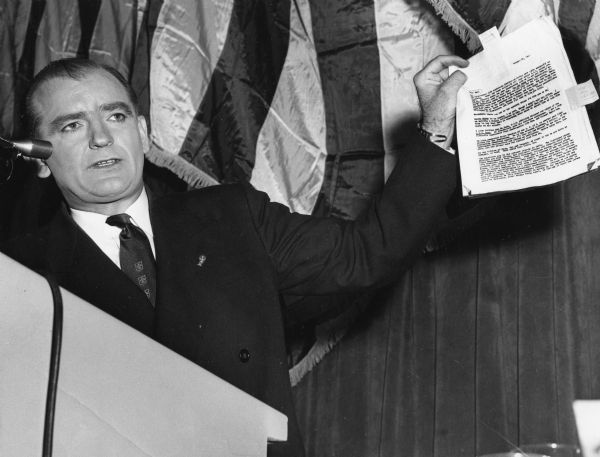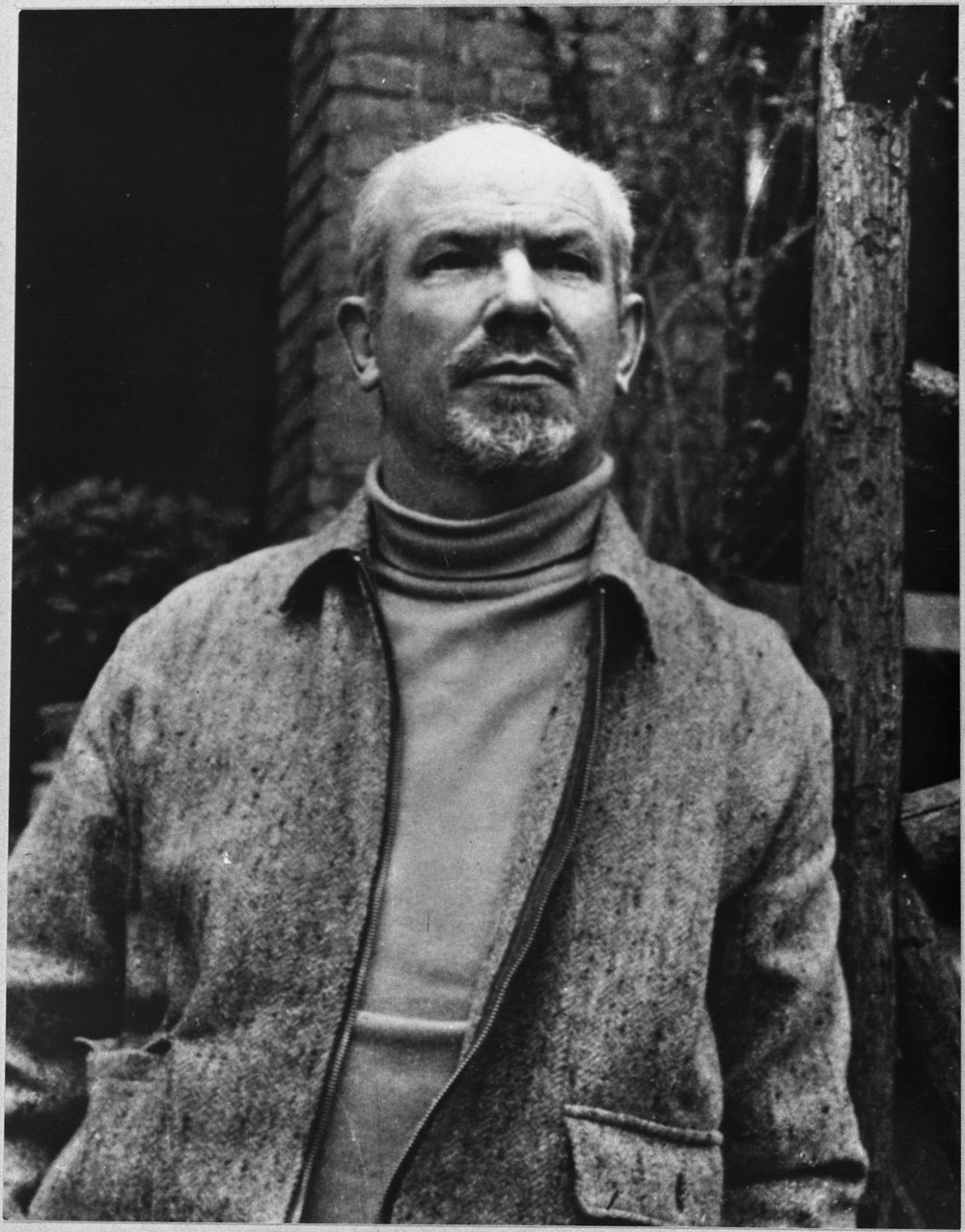Last week the Canadian government opened a new $2.5 million visitor’s centre at Bethune Memorial House in Gravenhurst, Ontario where physician Dr. Norman Bethune was born. A Parks Canada National Historic Site, it commemorates the life and achievements of this outstanding Canadian surgeon who pioneered techniques in thoracic surgery and provided care to wounded combatants in World War I, the Spanish Civil War, and during the second Sino-Japanese War, where he perished in the course of his service. However, that’s not the view of Conservative Member of Parliament for Calgary West, Rob Anders, who criticized the move in print, radio, and television interviews:
“The idea that taxpayer money is being used to glorify somebody who was a propagandist for Mao – there’s a lot of taxpayers out there who would say that was an inappropriate use of resources.” — Victoria Times Colonist
– – – – – – – – – – – – – – – – – – – – – – – – – – – – – – – – – – – – – – – – – – – – – – – – – – – – – – – – – –
“It’s 2.5 million dollars of taxpayer money. This is a fellow who was a fan and serves as a memorial for the support Mao Tse-tung who was the largest murder in human history having killed about 80 million people.
“I’m not the only person who isn’t a fan of the communist Party of China, or Mao Tse-tung, or Norman Bethune for that matter, so I think there are a lot of people out there who think its pretty questionable and spurious that taxpayer money is being used to support something like this. We’re spending millions on this person who lionized the biggest mass murder in history.
“In Norman Bethune I see a man who joined the Communist Party of Canada in 1935, went to Spain, and then after that went to support Mao Tse-tung for three years. Imagine if you had a doctor who went to support Pol Pot or Joseph Stalin. Should those people receive shrines or millions of dollars to build memorials to them?” — CBC Radio, As It Happens
– – – – – – – – – – – – – – – – – – – – – – – – – – – – – – – – – – – – – – – – – – – – – – – – – – – – – – – – – –
“This shrine to Norman Bethune, who I want to stress is not just a communist but a Maoist, and Mao is accused of killing about 80 million people. You don’t need taxpayer money to go ahead and memorialize someone who was a fan of the biggest killer in human history. And this man was used as a propagandist for Mao.
“This place was purchased by Trudeau in 1973, and it was because of his trip that he took to China just previous to that. And the idea that we’re just perpetuating this and putting millions and millions of taxpayer money into that, it’s a bit much. Shame on spending $2.5 million dollars of taxpayer money on a man who supports the biggest mass murder in human history.” — SUN TV News
Norman Bethune
Norman Bethune was born in Gravenhurst Ontario, the son of a Presbyterian minister. As a student in 1911 Bethune worked for a year as a volunteer with Frontier College at remote lumber and mining camps throughout northern Ontario, teaching immigrant mine labourers how to read and write English. When World War I broke out he joined the No. 2 Field Ambulance to serve as a stretcher-bearer in France. He was wounded by shrapnel and spent three months recovering.
Later, as a surgeon with the Royal Victoria Hospital in Montreal, he developed more than a dozen new tools for use in thoracic surgery, publishing 14 articles on his innovations. He frequently provided free medical care for the poor and agitated for reforms of medical care and health services in Canada forming the Montreal Group for the Security of People’s Health to press for socialized medicine. As such, he was an early pioneer of what later became (under the stewardship of Tommy Douglas) Medicare in Canada.

During 1936-1937 Bethune volunteered to head the Canadian Medical Unit of the Mackenzie-Papineau Battalion fighting alongside Spanish Republican forces against fascism in the Spanish Civil War. He developed the world’s first mobile medical unit to deliver blood transfusions, collecting blood from donors and delivering it to the battlefield, an invention that saved countless lives, and lead to the later formation of the Mobile Army Surgical Hospitals (MASH). His service lead to the city of Málaga naming an avenue, the “Walk of Canadians” in his honour: “In memory of aid from the people of Canada at the hands of Norman Bethune, provided to the refugees of Málaga in February 1937.”
The Mackenzie-Papineau Battalion is honoured in Canada with a monument in Ottawa unveiled on October 20, 2001 by Governor General Adrienne Clarkson who said:
“They were fighting for an ideal. They were fighting against fascism, which was like a rehearsal for the war to come. These men of the MacKenzie-Papineau Battalion of the XVth International Brigade of the Spanish Republican Army gave of themselves a passionate attachment to a civil war half a world away.” Clarkson referred to Bethune as an “extraordinary and eccentric figure of great passion and medical genius [who] developed the dramatic innovation which helped to save hundreds of lives on those battlefields and thousands later in the war in Europe — the transportable blood transfusion unit.”

In January 1938 Bethune traveled to China where he joined communist forces fighting the Imperial Japanese Army, which invaded China during the second Sino-Japanese War. Bethune performed emergency battlefield surgical operations on war casualties and established training for doctors, nurses, and orderlies. He treated the injured of both sides with impartiality. In an essay entitled Wounds Bethune wrote:
“Four Japanese prisoners. Bring them in. In this community of pain, there are no enemies. Cut away that blood-stained uniform. Stop that hemorrhage. Lay them beside the others. Why, they’re alike as brothers! Are these soldiers professional man-killers? No, these are amateurs-in-arms.”
In the summer of 1939 Bethune was appointed medical adviser to the Shanxi-Chahar-Hebei Border Region Military District under Nie Rongzhen. While operating on a soldier he cut his finger, contracted septicemia, and died on November 12, 1939. Bethune met Mao Zedong (Mao Tse-tung) only once. After his death Mao wrote a letter praising Bethune’s accomplishments:
“Comrade Bethune’s spirit, his utter devotion to others without any thought of self, was shown in his great sense of responsibility in his work and his great warm-heartedness towards all comrades and the people. No one who returned from the front failed to express admiration for Bethune whenever his name was mentioned, and none remained unmoved by his spirit. Comrade Bethune was a doctor, the art of healing was his profession and he was constantly perfecting his skill, which stood very high in the Eighth Route Army’s medical service. We must all learn the spirit of absolute selflessness from him.”
Mao Zedong
It’s beyond the scope of this short article to even briefly recount the career and political ideas of Mao Zedong. There is absolutely no doubt that Communist forces under his command were capable of great violence and brutality in a series of revolts and rebellions, in successive Sino-Japanese wars, and in the many stages the Chinese Civil War against Generalissimo Chiang Kai-shek’s Kuomintang army — but so were his opponents, devoted variously to monarchism, imperialism, colonialism, nationalism, and feudalism. Both the Japanese Imperial Forces and those of Chiang Kai-shek employed all manner of barbarity, terror, and violent purges against Mao’s Communists — and the Communists responded in kind. The era from 1911 to 1949 in China was an almost endless series of brutal and bloody wars.

Furthermore, it is certainly correct that Mao’s later initiatives such as the Great Leap Forward (1959-1963) and Cultural Revolution (1966-1976), whatever their economic and political successes and failures, caused extreme hardship to a large swath of the Chinese populace. For example, some 30 million Chinese peasants are thought to have died during the Great Chinese Famine between 1959-1962, caused in part by the economic policies of the Great Leap Forward.
Rob Anders

A former Reform Party MP, Rob Anders is well-known to Canadians for a variety of missteps, gaffes, and controversies. He began is political career as a professional heckler for the Republican Party in the United States which earned him the sobriquet of “a foreign political saboteur” from CNN. Anders was the sole parliamentarian to vote against making Nelson Mandela an honorary citizen of Canada in 2001. His campaign for the Wildrose Party of Alberta against Premier Alison Redford’s Progressive Conservatives generated controversy, as has his lobbying to cut off government funding for the CBC, and his removal from the House of Commons Standing Committee on Veterans Affairs, partly based on his tendency to fall asleep during meetings. Although nineteen members of Anders’ Calgary West riding association resigned en masse, protesting interference from the Conservative Party, Anders enjoys the support of Prime Minister Stephen Harper who has said, “Rob is a true reformer and a true conservative. He has been a faithful supporter of mine and I am grateful for his work.”
Historical Revisionism
Having established some of the historical facts, we are now in a position to evaluate Anders’ claims: dumb as dirt.
Bethune was unquestionably an extraordinary humanitarian who volunteered over and again to help the poor, downtrodden, and wounded of the world, at great personal risk, ultimately leading to his death. His work saved the lives of unaccountably many members of the “cannon-fodder” in wars in France, Spain, and China. He was undoubtedly an outstanding Canadian, a physician of great skill, courage, and social convictions. His advocacy of socialized medicine places him squarely in the tradition that gave rise to Medicare in Canada and his work tending the battlefield wounded place him in the company of Florence Nightingale and Medecins sans Frontieres. The Canadian Medical Association Journal called him “the world’s best known surgeon.”

In 1935 Bethune joined the Communist Party of Canada (not China). He was not a “Maoist”, indeed, he only met Mao once. Contrary to Anders’ claims he was never a “propagandist for Mao” and there is no evidence that Bethune “lionized” Mao. Whatever Mao’s faults — and they were many — during the two years (not three as Anders claims) when Bethune was in China (1938-1939) the Chinese communists were occupied with fighting an invasion by the Imperial forces of Japan and not with any internal repressions. Moreover, whatever Bethune’s political convictions, his work in China was of a humanitarian nature as a physician (he once performed 115 operations in the space of 69 hours — without sleep), not as a soldier, politician, or propagandist. By the time of Mao’s Great Leap Forward in 1949, Bethune had already been dead for a decade. The attempt to tarnish Bethune with the brush of Mao Zedong’s subsequent excesses is historically fallacious and absurd.
 Anders correctly criticizes the Chinese communist government for its policies of forced abortions, the persecution of Falun Gong, and the suppression of freedom of speech in Hong Kong, however these have nothing to do with Mao (who was long dead before their implementation), nor Bethune, who died even earlier. This attempt to tar everything connected to Mao Zedong with one brush is revisionist historical nonsense. One wonders, for example, how Anders would regard former American Secretary of State, Henry Kissinger (hardly a communist sympathizer), who actually did lionize Mao Zedong calling him a “philosopher king” and wrote in his book On China that “If China remains united and emerges as a 21st-century superpower,” many Chinese may come to regard Mao as they do the early emperor Qin Shihuang, “whose excesses were later acknowledged by some as a necessary evil.”
Anders correctly criticizes the Chinese communist government for its policies of forced abortions, the persecution of Falun Gong, and the suppression of freedom of speech in Hong Kong, however these have nothing to do with Mao (who was long dead before their implementation), nor Bethune, who died even earlier. This attempt to tar everything connected to Mao Zedong with one brush is revisionist historical nonsense. One wonders, for example, how Anders would regard former American Secretary of State, Henry Kissinger (hardly a communist sympathizer), who actually did lionize Mao Zedong calling him a “philosopher king” and wrote in his book On China that “If China remains united and emerges as a 21st-century superpower,” many Chinese may come to regard Mao as they do the early emperor Qin Shihuang, “whose excesses were later acknowledged by some as a necessary evil.”
The New McCarthyism
Beyond the sheer absurdity of Anders’ claims lie more serious issues. On July 10 hundreds of scientists gathered on Parliament Hill to protest the actions of the Harper Government in what was called the Death of Evidence rally. The hallmark of the protest was the slogan “No Science, No Evidence, No Truth, No Democracy.” This slogan and the concept of “Death of Evidence” can equally be applied to a plethora of policies being pursued by the Harper Conservatives, including historical revisionism of the kind represented in this story. To abandon fact, knowledge, reason, logic, science, and other evidence-based methods of decision making is to abandon rationality itself and with it democracy. This is an express train to chaos, absurdity, stupidity, mob rule, and overt manipulation as methods of governance.
Furthermore, history has provided us with a lesson of what an all-purpose association with “communism” can lead to in the form of Senator Joseph McCarthy. His scattershot accusations of communist sympathy, communist infiltration, and communist party membership transformed themselves into an all-purpose demagogy used to vilify a broad spectrum of people of differing political persuasions.

This same tendency is visible in, for instance, Public Safety Minister Vic Toews’ nostrum that people “either stand with us [i.e., the Harper Conservatives] or with the child pornographers” or Environment Minister Peter Kent’s on-going references to environmentalists as “radicals” and “extremists.” In all these instances the attempt is to radically polarize and simplify a discourse and to demonize those of other positions by tarring them with a politically toxic label that derails all further discussion. Thus, the word “communist” consigns anyone associated with it — and any position they take or idea they espouse — into utter social and political oblivion. No further discussion is even considered necessary and guilt by association is taken as self-evident.
The names of Norman Bethune or Pierre Elliot Trudeau receive mention in a vaguely defined and ambiguously specified way alongside those of Mao Zedong, Pol Pot, and Joseph Stalin and the connection between them is taken to be self-evident. Providing an illustration of the level to which such nonsense can descend, Sun TV’s Krista Erickson refers to Conservative Treasury Board president “Tony Clement being awash in all this communist symbolism and arriving [at the opening of the Gravenhurst visitors center] in a rickshaw” hilariously construing a ‘rickshaw’ to be a communist symbol.
Extraordinarily, however, Anders sees nothing contradictory in Canada continuing its robust economic trade with China stating that, “They [China] are still going to buy oil, they’re still going to buy wheat, they’re still going to buy wood and I don’t think you should deprive Canadian loggers, or oil patch workers, or farmers the ability to sell their product.” This is another illustration of fallacious reasoning, there being many potential markets for these goods aside from China. In an essay for the Medicine Hat News entitled Is Canada friends with communist China or not? journalist Alex McCuaig points out the absurdity of Anders’ position:
“It’s hard to understand why Bethune is even an issue for those on the right of the nation’s political spectrum in light of the fact communist Chinese government-run companies are buying up Alberta’s oilsands without so much of a peep. Canada and Alberta governments have established permanent offices in the non-democratic country in efforts to court Communist officials to invest in this country. Trade ties have only strengthened between China and Canada in the last two decades despite the still open wounds left by the People’s Liberation Army’s massacre of pro-democracy demonstrators.
“And despite the continued strong-arm tactics of the Chinese Communist Party in preventing free speech, an open court system and rule of law or even small protests, Canada continues to provide material support to this tyrannical regime.
“So why does it matter if we honour the birthplace of a man who revolutionized battlefield surgical techniques during a war against Nazis and Imperial Japan more than 70 years ago? A man who also happened to be a communist. Chinese communists are our friends these days, aren’t they?”

In other words, the cherry-picking of facts and a selective interpretation of history can allow one to concoct any nonsense whatsoever. The lesson here is clear: if Canadian political discourse is allowed to descend to the level of the sheer stupidity of dirt — bereft of evidence, fact, reason, and logic — democracy itself dies a painful death. Respect for truth — scientific and historical — are the prerequisites for any form of sane government. To the degree that the Harper Conservatives increasingly depart from rationality, Canadian governance staggers towards a troubling precipice, a rictus of horror frozen on the faces of ever more Canadians.
Christopher Majka is an ecologist, environmentalist, policy analyst, and writer. He is the director of Natural History Resources and Democracy: Vox Populi.



